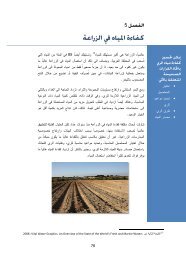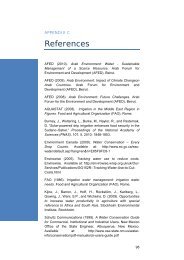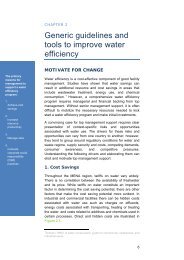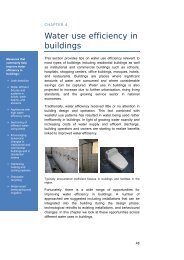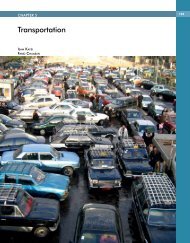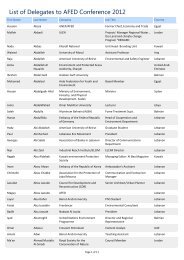Impact of Climate Change on Arab Countries - (IPCC) - Working ...
Impact of Climate Change on Arab Countries - (IPCC) - Working ...
Impact of Climate Change on Arab Countries - (IPCC) - Working ...
Create successful ePaper yourself
Turn your PDF publications into a flip-book with our unique Google optimized e-Paper software.
ARAB ENVIRONMENT: CLIMATE CHANGE 139<br />
Sector-based approaches can avoid competitiveness<br />
c<strong>on</strong>cerns by negotiating emissi<strong>on</strong>s targets for<br />
particular industries, including those located in<br />
developing countries - but like the other<br />
approaches <str<strong>on</strong>g>of</str<strong>on</strong>g>fer <strong>on</strong>ly a partial soluti<strong>on</strong>.<br />
Emissi<strong>on</strong>s-based approaches <str<strong>on</strong>g>of</str<strong>on</strong>g>fer countries the<br />
flexibility to design emissi<strong>on</strong> reducti<strong>on</strong> strategies<br />
that are most appropriate to their nati<strong>on</strong>al circumstances.<br />
Smaller agreements <str<strong>on</strong>g>of</str<strong>on</strong>g>fer the potential <str<strong>on</strong>g>of</str<strong>on</strong>g><br />
early acti<strong>on</strong>-not waiting until 2012 for effective<br />
resp<strong>on</strong>ses to begin, but starting <strong>on</strong> whatever is feasible<br />
now. If successful, these partial agreements<br />
could also be included at a later date under an<br />
umbrella <str<strong>on</strong>g>of</str<strong>on</strong>g> a climate change agreement.<br />
X. BALI ROAD MAP<br />
In Bali, Ind<strong>on</strong>esia, in December 2007, the<br />
C<strong>on</strong>ference <str<strong>on</strong>g>of</str<strong>on</strong>g> the Parties to the C<strong>on</strong>venti<strong>on</strong> <strong>on</strong><br />
<str<strong>on</strong>g>Climate</str<strong>on</strong>g> <str<strong>on</strong>g>Change</str<strong>on</strong>g> (COP 13) c<strong>on</strong>cluded with<br />
agreement <strong>on</strong> the ‘Bali Acti<strong>on</strong> Plan.’ The plan<br />
creates a process and a set <str<strong>on</strong>g>of</str<strong>on</strong>g> principles, with few<br />
specifics, for negotiating a post-2012 agreement.<br />
It calls for a l<strong>on</strong>g-term goal for global emissi<strong>on</strong>s<br />
reducti<strong>on</strong>s and various mitigati<strong>on</strong> acti<strong>on</strong>s for<br />
developed and developing countries. Besides<br />
mitigati<strong>on</strong>, it also includes adaptati<strong>on</strong>, deforestati<strong>on</strong>,<br />
technology development and transfer, and<br />
finance.<br />
Mitigati<strong>on</strong><br />
In the Bali Acti<strong>on</strong> Plan, the C<strong>on</strong>ference <str<strong>on</strong>g>of</str<strong>on</strong>g> the<br />
Parties (COP) recognized that ‘deep cuts in global<br />
emissi<strong>on</strong>s will be required to achieve the ultimate<br />
objective <str<strong>on</strong>g>of</str<strong>on</strong>g> the C<strong>on</strong>venti<strong>on</strong>’ and emphasized<br />
the urgency <str<strong>on</strong>g>of</str<strong>on</strong>g> acti<strong>on</strong>, ‘as indicated in the<br />
Fourth Assessment Report <str<strong>on</strong>g>of</str<strong>on</strong>g> the<br />
Intergovernmental Panel <strong>on</strong> <str<strong>on</strong>g>Climate</str<strong>on</strong>g> <str<strong>on</strong>g>Change</str<strong>on</strong>g>.’<br />
The COP did not move forward <strong>on</strong> targets and<br />
timetables for emissi<strong>on</strong> reducti<strong>on</strong>s, but decided<br />
to seek agreement by 2009 <strong>on</strong> ‘a shared visi<strong>on</strong> for<br />
l<strong>on</strong>g-term cooperative acti<strong>on</strong>, including a l<strong>on</strong>gterm<br />
goal for emissi<strong>on</strong> reducti<strong>on</strong>s’ to prevent<br />
dangerous anthropogenic interference with the<br />
climate system.<br />
Decisi<strong>on</strong> 1(b)(i) calls <strong>on</strong> all developed countries<br />
to c<strong>on</strong>sider:<br />
Measurable, reportable and verifiable nati<strong>on</strong>ally<br />
appropriate mitigati<strong>on</strong> commitments or acti<strong>on</strong>s,<br />
including quantified emissi<strong>on</strong> limitati<strong>on</strong> and<br />
reducti<strong>on</strong> objectives, while ensuring the comparability<br />
<str<strong>on</strong>g>of</str<strong>on</strong>g> efforts am<strong>on</strong>g them, taking into<br />
account differences in their nati<strong>on</strong>al circumstances.<br />
For developing countries, Decisi<strong>on</strong> 1(b)(ii) calls<br />
for the c<strong>on</strong>siderati<strong>on</strong> <str<strong>on</strong>g>of</str<strong>on</strong>g>:<br />
Nati<strong>on</strong>ally appropriate mitigati<strong>on</strong> acti<strong>on</strong>s in the<br />
c<strong>on</strong>text <str<strong>on</strong>g>of</str<strong>on</strong>g> sustainable development, supported<br />
and enabled by technology, financing and capacity-building,<br />
in a measurable, reportable and verifiable<br />
manner.<br />
Unlike for developed countries, there is no menti<strong>on</strong><br />
<str<strong>on</strong>g>of</str<strong>on</strong>g> quantified emissi<strong>on</strong> limitati<strong>on</strong> or reducti<strong>on</strong><br />
objectives for developing countries.<br />
Adaptati<strong>on</strong><br />
Decisi<strong>on</strong> 1(c) <str<strong>on</strong>g>of</str<strong>on</strong>g> the Bali Acti<strong>on</strong> Plan calls for<br />
enhanced acti<strong>on</strong> <strong>on</strong> adaptati<strong>on</strong>, including c<strong>on</strong>siderati<strong>on</strong><br />
<str<strong>on</strong>g>of</str<strong>on</strong>g>:<br />
(i)<br />
TABLE 1<br />
Approaches<br />
Country-based<br />
Sector-based<br />
Policy-based<br />
Measures-based<br />
PROPOSALS FOR PARTIAL SOLUTIONS<br />
Examples<br />
Agreements between the top-emitting countries<br />
in the world, or alternatively, smaller geographic groups<br />
Agreements <strong>on</strong> emissi<strong>on</strong>s reducti<strong>on</strong>s in specific<br />
categories – e.g., power, transportati<strong>on</strong>, aluminium,<br />
steel, cement, appliances, buildings, forestry<br />
Agreements to impose harm<strong>on</strong>ized carb<strong>on</strong> taxes or<br />
reduce emissi<strong>on</strong>s intensity<br />
Agreements <strong>on</strong> specific emissi<strong>on</strong>s reducti<strong>on</strong>s strategies<br />
– e.g., energy efficiency, renewable energy,<br />
development finance, land use regulati<strong>on</strong><br />
Internati<strong>on</strong>al cooperati<strong>on</strong> to support<br />
implementati<strong>on</strong> <str<strong>on</strong>g>of</str<strong>on</strong>g> adaptati<strong>on</strong> acti<strong>on</strong>s<br />
including through vulnerability assessments,<br />
prioritizati<strong>on</strong> <str<strong>on</strong>g>of</str<strong>on</strong>g> acti<strong>on</strong>, financial<br />
needs assessment, capacity-building and<br />
resp<strong>on</strong>se strategies, integrati<strong>on</strong> <str<strong>on</strong>g>of</str<strong>on</strong>g> adaptati<strong>on</strong><br />
acti<strong>on</strong>s into sectoral and nati<strong>on</strong>al<br />
planning, specific projects and programmes,<br />
means to incentivize the implementati<strong>on</strong><br />
<str<strong>on</strong>g>of</str<strong>on</strong>g> adaptati<strong>on</strong> acti<strong>on</strong>s, and<br />
other ways to enable climate-resilient<br />
development and reduce vulnerability <str<strong>on</strong>g>of</str<strong>on</strong>g><br />
all PartiesÖ;



